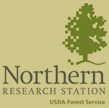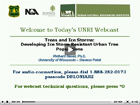Management – Community Based – Community Stability
Community Stability
Research by UNRI scientists in this area focuses on four conceptual, methodological, and applied areas: the relationship between the social and biophysical structure and function of communities, especially social and biophysical restoration and ecosystem and human community stability; property / tenure regimes (state, private, community, and open access) and land use from household to regional scales; social stratification and ecological processes, including equity; and the development of long term, multi-scale social / biophysical Geographic Information Systems (GIS) for forest policy and management.
Further, urban natural resources practice takes place within organizational networks and often manipulates social institutions such as markets, governments, and education in order to achieve its goals. Thus, understanding social structures and processes is essential to achieving forestry goals.
UNRI research in this problem area links to other initiatives of the work unit by scale — such as aesthetic, spiritual, and moral values (individual scale) and market values (regional scale) — and by discipline — such as biodiversity and watershed hydrology.
For more information on UNRI research related to community stability please visit RWU-NE-4454, located in Burlington, VT (Integrating Social and Biophysical Sciences for Natural Resource Management) or the Baltimore Ecosystem Study (BES) Long-Term Ecological Research Program (LTER) websites


